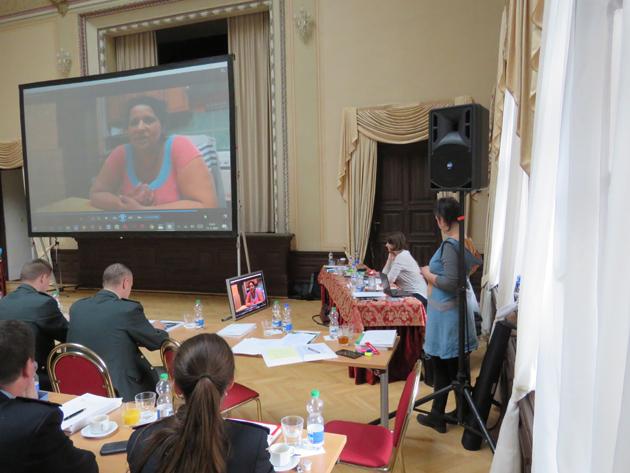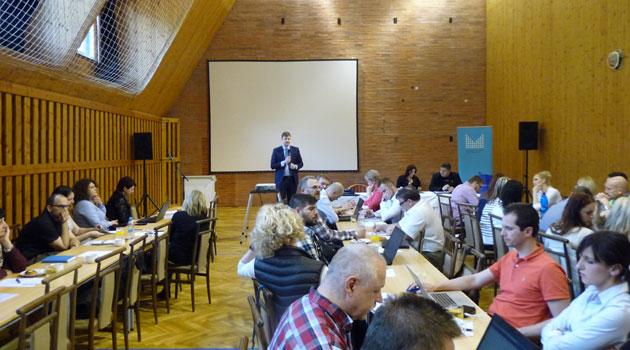Czech Police expert: Project to improve Romani citizens' faith in the police is a marathon, not a sprint

On 11 April the final three-day meeting of the educational project entitled “How to introduce police specialists for work with the Romani minority group in socially excluded localities” was held in Zbiroh, Czech Republic. Among those lecturing was Petr Torák, a Romani police officer born in Czechoslovakia who has been made a Member of the British Empire for his service, as well as the director of the Museum of Romani Culture, Jana Horváthová.
The meeting of 90 police officers from all 14 Regional Police Directorates was organized by the Police Services Directorate of the Police Presidium of the Czech Republic. That directorate is responsible for the minorities portfolio.
This instructional and methodological work was begun by the Director of the Police Services of the Czech Republic Police Directorate and by Colonel Martin Hrinko, the project director. The three-year project aimed to equip police officers with the appropriate knowledge and social competences to be able to effectively work with members of the Romani minority, accroding to project manager Václav Vlček.
Czech Police officers gained experience through study trips to England and Portugal
Czech Police officers got the opportunity to familiarize themselves with work methods that their European colleagues have already demonstrated the effectiveness and sense of. Thanks to the project, officers attended two working trips in England and an educational trip in Portugal where they became acquainted with the work of the National Center for the Support of Migration, the National NET-Card Project combating discrimination of Romani people, and the activity of the Commission for Equality and against Racial Discrimination.
The consequences of integrating members of Romani communities in Great Britain and the work of the British Police with the Romani community in Cambridgeshire was presented in Zbiroh by Torák, a police officer who works in Peterborough, England and has been given the honor of becoming a Member of the British Empire. From Slovakia, Police Major Michal Valach and Police Major Peter Čajka came from the Police Corps Presidium of the Slovak Republic to contribute their experiences of working in excluded localities there, while Colonel Lubomír Kopčo from the Regional Directorate of the Police Corps in Košice also presented.
During the three days of training, topics related to the cultural, historical and social specificity of the Romani minorities living in the Czech Republic were discussed. Horváthová briefly introduced the history of Romani people, from their first arrival to Europe from India up to the present day.
A lecture on the topic of the cultural specifics of the Romani minority was presented by Renata Berkyová and Karolína Ryvolová, lecturers from the ROMEA, o.p.s. organization, who also led the officers through an exercise of putting together a list of Romani people who are successful professionals. Aurélie Balážová, Lucie Fuková and Martina Horváthová of the SLOVO 21 organization then explained the position of Romani women in contemporary Romani communities and families.
Building trust between police and Romani people is a priority of the first order
A crucial area of the project was that of communication and the systematic building of mutual trust between police and the residents of socially excluded localities, as has been confirmed by the findings of a survey aimed at accumulating and assessing the opinions of almost 5 000 Romani people living in socially excluded localities about police activity. The survey was reported on by Marián Svoboda, director of the AUGUR Consulting company, which produced the analysis.
The areas surveyed were, for example, how locals assess police work, what their experience is of it, how much trust they have in the police, etc. The issue of hoaxes and of refuting prejudices online was then discussed by Jana Leitnerová from the “HateFree Culture” campaign, run by the Czech Government Agency for Social Inclusion.
Václav Šaroch, who works for the Orlová Municipal Police, then spoke on the topic of police officers’ resilience to the psychological stresses of working in a multicultural environment. The final contribution was delivered by Czech MEP Jan Keller, a sociologist by training, about the coexistence of minorities in the multiculturalism of Europe.
The very last instructional/methodological task was the giving of awards to 11 police officers by the Regional Police Directorate for their significant personal contributions to crime prevention in the area of working with minorities. The medals were distributed by the project director, Colonel Martin Hrinko, and by the contact officer for minorities, Lieutenant Colonel Alexander Stambolidis from the Police Force Directorate of the Czech Republic.
Police specialists will continue to function once the project ends
The project, which was supported by Norway Grants with a contribution of CZK 16.5 million [EUR 614 000], closes at the end of this month. Its sustainability is established for a five-year period.
“At a minimum, during that time the specialists will function under the current conditions,” explained project manager Václav Vlček. The program has been attended since 2014 by police officers from the Karlovy Vary, Moravian-Silesian, Olomouc and Ústecký Regions, who are then meant to act as intermediaries between Romani community members and police – or rather, between Romani community members and those of the majority society.
“Our aim is naturally to gradually expand the number of specialists into other regions of the Czech Republic. It’s possible that we will do this by taking advantage of the next program period of the Norway Grants,” the project manager told news server Romea.cz.
Vlček said he is of the opinion that the project model has proven effective during the three years of its implementation and that it would be an error to abandon it. “Personally I consider the functioning and involvement of these specialists as very good. That is determined especially by the fact that these are police officers who expressed their own personal interest in this work, which can be seen in their approach to it,” he said.
The reflection of this training on police practice, however, is just too difficult to measure, in his view. “This is a marathon. We’re not just ‘checking off the boxes’, this is about building relationships. My subjective feeling is that we have made the police more visible in the eyes of many Romani people here by approaching them and vice versa. That’s important,” he concluded.
